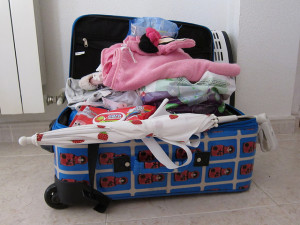travel insurance

On a tight budget? You can still travel the world.
I’m pleased to present another guest post from Jim McKinley, our financial writer in residence (well, virtual residence), who always has good tips for baby boomers who want to make wise use of their travel funds — and who doesn’t?
In today’s post, Jim — a baby boomer himself — looks at several ways to save money on a trip, both leading up to and during your travels.
By Jim McKinley
Many baby boomers have more time to travel now, whether it’s because they’re empty-nesters or retirees, and they’re pursuing it with more intense interest as well, as bucket lists beckon.
The good news is that travel is good for you, with benefits for the mind and body.
You’ll stay active strolling around museums and markets, swimming in the sea, or hiking in the forest, and it’ll broaden… Continue reading

While you’re running with the bulls in Spain, someone may be making off with your possessions.
Today’s guest post may save you some money if you’re a traveler and a renter — and have renters’ insurance.
How much do you know about what your policy covers? You may be pleasantly surprised.
I know I’m going to check my policy more carefully from now on!
By Armand Levitz
With an average cost of only $12 a month, renters’ insurance offers tremendous value at a low price.
But what many travelers don’t realize is that renters’ insurance can protect you even when you’re far from home.
And you don’t even need an international renters insurance plan to be protected abroad.
Take the example of one couple, Andres Modak and Rachel Cohen, who recently took a trip to Spain to attend a wedding.
Unfortunately, what should have been a… Continue reading

Overpacking can slow you down and limit mobility. Photo by Keith Williamson on flickr.
Sometimes even experienced travelers make simple mistakes that can get a trip off to a very bad start, or even ruin it altogether.
The folks at by Grand European Travel — which specializes in guided vacations and river cruises in Europe and around the world — have developed a helpful infographic that identifies six common travel mistakes that it would be wise to review before setting off on your next foreign trip.
I’m not immune to making some of these mistakes (sometimes it’s easier to dish out advice than follow it).
My rookie mistakes have included not properly insuring my trip, not packing light, and not notifying my banking institutions that they can soon expect to see charges appearing from places like St. Lucia, Hungary, or the Falkland Islands.
I’m pretty anal about… Continue reading

Whether running with the bulls or leaving a museum in Pamplona, it pays to have travel insurance.
Getting travel insurance may seem like an afterthought, but there are times when it proves vital.
When my mother broke her hip in Pamplona, Spain — I’d like to say running with the bulls, but actually slipping and falling on her way out of a museum — she had a week’s stay in a hospital there and then a first-class flight home complete with nurse accompaniment, all covered by travel insurance.
It was one of the best investments my parents ever made, because the bill ran to something like $30,000-$40,000.
Many personal health insurance policies don’t cover medical costs abroad, so it pays to be on the safe side. For an outlay of perhaps five to 15 percent of the total cost of your trip, you could save yourself a significant… Continue reading

A Malaysian medical team at work; if you carry your medical ID, they’ll know how to treat you
With the oldest baby boomers now in their early seventies and the youngest in their early fifties, traveling with medical conditions has become a major issue for the baby boom generation.
British freelance writer Laura Miller has compiled a practical guide to coping with medical conditions while on the road (or in the air, on the water, etc.), so that all of us with medical issues can enjoy our travels to the utmost.
Her guide is long enough that I’ll be running it over the course of several posts, so stay tuned for more. My thanks to Laura for providing us access to this important series.
By Laura Miller
Having a chronic or serious medical condition doesn’t mean you can’t travel safely — but you will need to take… Continue reading
In our last post, we posed ten questions that might affect your health and well-being as a traveler. Here are the answers:
1. The direction in which you fly may influence the severity of your jet lag. Other conditions being equal, which direction is most likely to produce bad jet lag?
Answer: B, West to east. When flying west to east, especially across America, you’re more likely to encounter darkness when you arrive, which helps disrupt the body’s “inner clock” (jet lag is caused by disorientation by crossing time zones, which exposure to light seems to ameliorate). Assuming no time zones are crossed, there’s technically no jet lag at all flying north-south or south-north, though you can still feel the ill effects of a long flight.
2. One good way to counter the effects of jet lag is to:
Answer: D… Continue reading











